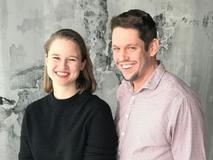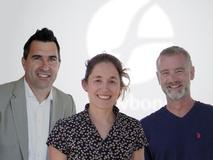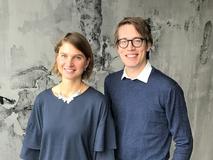Startups Making Sweat-Analyzing Stress-Sensors and Advancing Bone Repair and Tissue Regeneration Each Win CHF 40,000
02.04.2020
Learn more about the Swiss science spin-offs EpyMetrics, FLOWBONE and Regenosca developing respectively wearables for proactive, personalized health; better biomaterial for fragile bones; and structures to reconstruct our post-surgery bodies. The winning founders receive Venture Kick's second stage of pre-seed funding, network support, and entrepreneurial training.
.jpg) |
 epyMetrics co-founders Edith Schmid and Yves Delley
|
 FLOWBONE: Régis Gauderon, Kettenberger Ulrike, Prof. Dominique Pioletti
|
 Regenosca: Eva-Maria Balet and Mattias Larsson
|
EpyMetrics: wearables to diagnose stress early
www.venturekick.ch/epyMetrics
Heat stress reduces our ability to concentrate and perform physical work. When our bodies become too hot, we risk accidents, exhaustion and other severe health conditions. The UN estimates that heat stress caused by climate change may reduce global productivity by $2 trillion annually, as employees working in many outdoor and indoor industries suffer worse health. EpyMetrics co-founders Yves Delley, Edith Schmid, and Peter Seitz have developed a wearable to continuously monitor our bodies’ thermoregulation and detect heat stress earlier, without interrupting work. The team's comprehensive set of sensors and software models core body temperature and sweat data to keep workers safe.
www.venturekick.ch/epyMetrics
Heat stress reduces our ability to concentrate and perform physical work. When our bodies become too hot, we risk accidents, exhaustion and other severe health conditions. The UN estimates that heat stress caused by climate change may reduce global productivity by $2 trillion annually, as employees working in many outdoor and indoor industries suffer worse health. EpyMetrics co-founders Yves Delley, Edith Schmid, and Peter Seitz have developed a wearable to continuously monitor our bodies’ thermoregulation and detect heat stress earlier, without interrupting work. The team's comprehensive set of sensors and software models core body temperature and sweat data to keep workers safe.
FLOWBONE: injectable biomaterial for bone repair
www.venturekick.ch/FLOWBONE
As our societies age, orthopedic surgeons see more patients with bone fractures. Today every 3rd woman and every 5th man over 50 will experience a fracture. Unfortunately, drugs used to treat bone fragility are unspecific and slow, while bone cement injections aren't clearly beneficial. FLOWBONE's injectable biomaterial, the result of more than six years research at EPFL, allows fragilized bone to augment and repair itself, without impeding bone mechanics or blood flow within the tissue. The team of inventor Ulrike Kettenberger, Régis Gauderon and Prof. Dominique Pioletti are now preparing for clinical studies.
www.venturekick.ch/FLOWBONE
As our societies age, orthopedic surgeons see more patients with bone fractures. Today every 3rd woman and every 5th man over 50 will experience a fracture. Unfortunately, drugs used to treat bone fragility are unspecific and slow, while bone cement injections aren't clearly beneficial. FLOWBONE's injectable biomaterial, the result of more than six years research at EPFL, allows fragilized bone to augment and repair itself, without impeding bone mechanics or blood flow within the tissue. The team of inventor Ulrike Kettenberger, Régis Gauderon and Prof. Dominique Pioletti are now preparing for clinical studies.
Regenosca: off-the-shelf scaffolds for better tissue regeneration, no scarring
www.venturekick.ch/Regenosca
After operations on the urethra or bladder patients often need tissue grafts or synthetic meshes to fill the voids in their bodies. Grafts can be painful, while synthetic options are prone to failure. Regenosca's patented medical device -- a scaffold that induces better tissue regeneration in reconstructive surgery -- provides a shapeable, off-the-shelf alternative that's quicker and easier to handle than current technology. The team of surgeons and EPFL scientists Mattias Larsson, Eva-Maria Balet, Kalitha Pinnagoda, and Ganesh Vythilingam are now preparing a first-in-human study.
www.venturekick.ch/Regenosca
After operations on the urethra or bladder patients often need tissue grafts or synthetic meshes to fill the voids in their bodies. Grafts can be painful, while synthetic options are prone to failure. Regenosca's patented medical device -- a scaffold that induces better tissue regeneration in reconstructive surgery -- provides a shapeable, off-the-shelf alternative that's quicker and easier to handle than current technology. The team of surgeons and EPFL scientists Mattias Larsson, Eva-Maria Balet, Kalitha Pinnagoda, and Ganesh Vythilingam are now preparing a first-in-human study.


